Discover the YAKA project
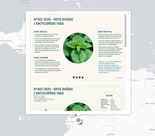
As part of its latest Call for Ideas, CartONG is supporting this year two volunteer initiatives called MapATI & YAKA. In this article, we invite you to learn more about the YAKA project led by a team of six volunteers whose objective is to reference, document and transmit the know-how of self-sufficient communities, alternative societies and eco-villages around the world.
“YAKA”: origins and raison d’être
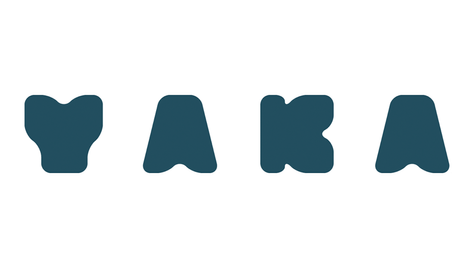
YAKA is a non-profit association created in 2016 to reference, document and promote the knowledge and know-how of actors, communities and organizations that are reinventing “living together”. Although this knowledge exists today, it is not always accessible to a great number of people, mainly because of its technical nature. YAKA aims to democratize these practices in order to make them accessible to everyone and by doing so, to raise awareness about the challenges of sustainable development. Above all, the objective of this project is to show that it is possible to live differently while respecting humans and their environment, and without continuing to participate in the destruction of our ecosystems.
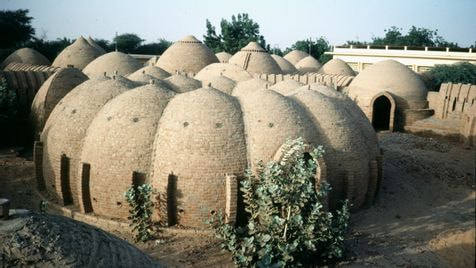
For the past 3 years, YAKA has been looking for ecological and resilient initiatives around the world to produce documentary videos and photo reports that are then made accessible to as many people as possible. After visiting India, Nepal, Senegal and Nicaragua to meet actors, communities and organizations that are reinventing how people can live together, the YAKA team wanted to extend the scope of their project by using new tools. The objective? To give a greater impact to the association’s message and to reach a larger number of people, while continuing the production of videos and other communication materials for the general public.
The association thus turned its attention to two new aspects, namely data collection implementation and the creation of an interactive map. It is in this context that the support of CartONG – firstly financial through the 2019 Call for Ideas, but also technical in regard to its data collection and mapping expertise – has become particularly relevant. Thanks to CartONG, YAKA now receives the precious help of a volunteer, for the design of their interactive map, and of its employees, for the implementation of the data collection processes – an indispensable support for the YAKA team, who has an opportunity to implement its newest ideas and improve its tools.
A two-part data collection process
The data collection process consists of two main parts. The first one is built around research work, which consists of deepening YAKA’s knowledge of alternative communities (eco-villages, eco-places, eco-hamlets, etc.) and traditional ecological communities through a questionnaire. The idea of this questionnaire is to establish the key aspects of the alternative communities being surveyed in order to better understand how they function and to be able to come up with “identity cards” outlining their main characteristics.
Why choosing KoboToolBox?
For this first collection – which has already been launched – the YAKA team chose to use KoBoToolbox because the tool met the identified essential needs of the data collection process:
- Simplified language management: KoBo makes it possible to have the questionnaire in several languages while leading to a common analysis
- Advanced question options
- Free access to the selected tool
- Offline form management: KoBo is compatible with the ODK-related tools that allow the offline use of questionnaires
- Versatile results analysis and data management: KoBo has online and offline analysis tools and capabilities
- Quick and efficient handling: one member of the YAKA team being already familiar with this tool, it seemed simpler to favor the use of this tool as it required a reduced self-training time.
The related practical notions now need to be developed in order to compile the full guide. To do so, the association wishes to interview as many people as possible, from as many different backgrounds as possible. YAKA will also rely on a questionnaire. The choice of the tool for the said questionnaire is however still under consideration, as for this second data collection, the needs are different from those surrounding the first data collection. Indeed, the latter is intended to be widely distributed to reach a larger and more diverse number of people. The objective is therefore to find a tool that allows for a more complete work on the design of the questionnaire than KoBoToolbox, with less emphasis on advanced question settings.
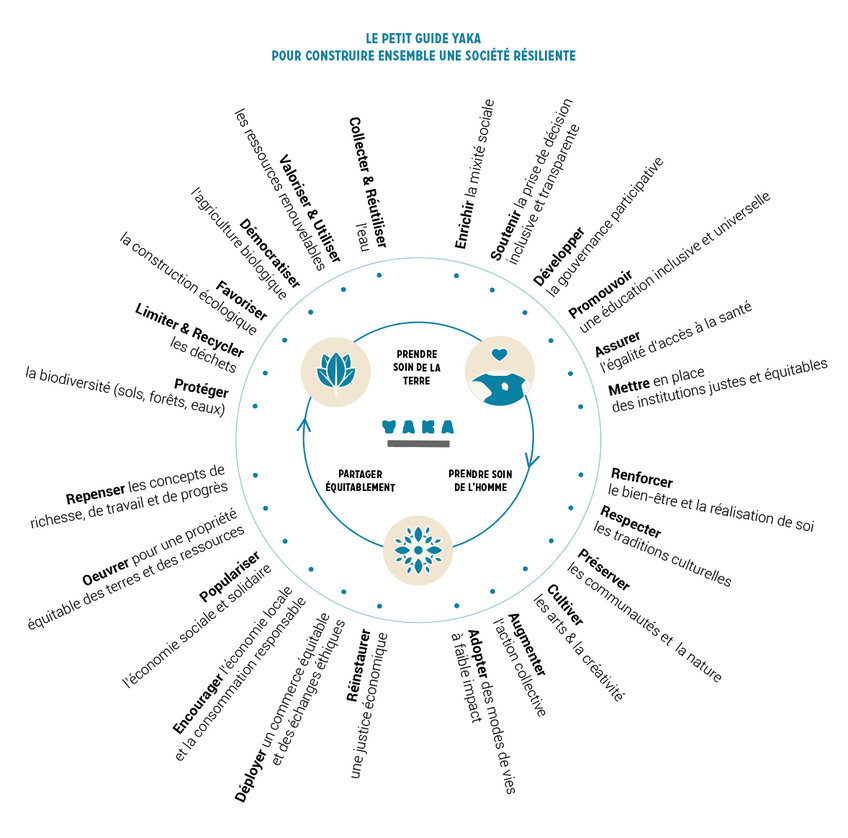
The second part of the data collection work conducted by YAKA is envisaged around the elaboration of a “guide for building a resilient society together”. Indeed, the YAKA team wishes to design a tool accessible to all and which gives each person avenues of action to move towards a sustainable and resilient society. For this purpose, an infographic gathering the basic points of a resilient society was designed by YAKA (in French only).
What place for the mapping tool in the YAKA project?
In parallel to the use of data collection tools, YAKA is working to develop an online interactive map using an open source platform thanks to the support of CartONG volunteers who already have experience in this type of support This interactive map – which will be added to the association’s website (website soon to be launched) – aims to spatially represent the communities met by YAKA around the world, and to compile somewhere all the identity cards produced through the first data collection. This step is currently being carried out with the support of a CartONG volunteer who is helping the YAKA team in the design of the online map. The tool used for this work is uMap – an open source tool and considered sufficient for the needs of the project.
The impact of the Covid-19 crisis on 2020 activities
In order to test the first data collection tool and the relevance of using a mapping tool for the YAKA project, a member of the association – Chloé – traveled to meet with alternative communities in Central America during the months of February and March 2020. During this time, she was able to discover their way of life, participate in the different works carried out by the communities she met (construction, agriculture, community life, etc.), as well as produce digital content and set up the first data collection. The idea was for her to go and meet different cultures in order to see the relevance of the tools designed and the reaction of the communities she met.
However, due to the global pandemic, her journey had to be shortened – she had initially planned to return to France only in August 2020 – and it was therefore not possible for her to meet with a lot of the actors she was planning on seeing. This is why the association is now considering adapting its data collection by conducting video and/or phone interviews with the communities in question, when technological conditions allow it.
In addition, the test phase continues to be carried out in France. To this end, Chloé is currently in the Tarn region visiting the “Gaïa’s dream” eco-project producing new digital content and testing the tools.
Knowledge dissemination and future projects
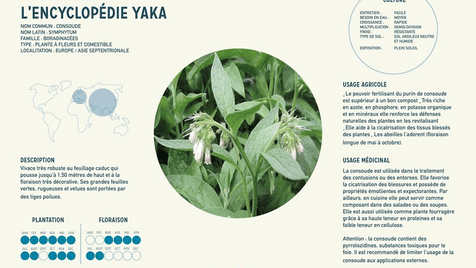
If the project has been impacted by the pandemic – in particular due to travel restrictions, the project in itself hasn’t been called into question: the team is more motivated than ever to participate in the construction of tomorrow’s world. In parallel to the test phase, the YAKA team is therefore continuing to share existing knowledge about ecology by popularizing it through numerous informative and innovative infographics. Below is an example of the YAKA encyclopedia on medicinal plants.
In the long term, YAKA intends to make all its tools freely available, especially so that communities can be referenced – through data collection and by as many people as possible.
To learn more about YAKA, we invite you to follow the project’s Facebook account and its Youtube channel, as well as the CartONG social network accounts. If you have any questions or would like to get involved, you can also contact the YAKA team by email here.